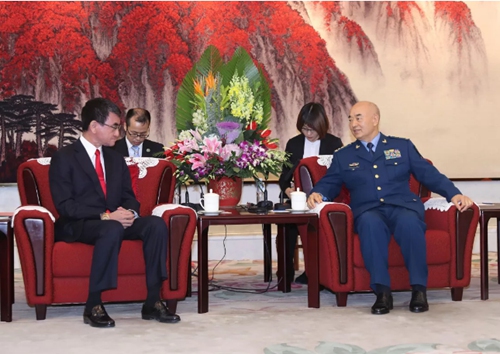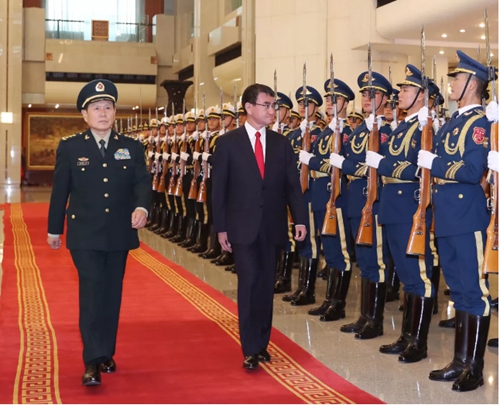HOME >> CHINA
Senior Chinese military officials meet Japanese defense chief
By Deng Xiaoci Source:Global Times Published: 2019/12/18 23:03:40

Xu Qiliang, vice chairman of China's Central Military Commission meets visiting Japanese Defense Minister Taro Kono. Photo: Courtesy of Ministry of National Defense

Chinese State Councilor and Defense Minister Wei Fenghe walks with visiting Japanese Defense Minister Taro Kono. Photo: Courtesy of Ministry of National Defense
Senior Chinese defense and military officials and the Japanese defense chief agreed to boost mutual trust and improve ties between the two countries' militaries following their meeting in Beijing as the first visit of a Japanese defense chief to China in over 10 years kicked off Wednesday.
Xu Qiliang, vice chairman of China's Central Military Commission and Chinese State Councilor and Defense Minister Wei Fenghe, met visiting Japanese Defense Minister Taro Kono.
During the meeting, Xu said China was willing to work together with the Japanese side to jointly safeguard regional and global peace and stability.
Kono said that the Japanese side values its ties with China and he hoped to strengthen security exchanges and cooperation with the Chinese side through the visit, deepen understanding, positively manage disagreements and avoid misjudgments.
Wei during his meeting with his Japanese counterpart noted that led by the leaders of the two countries, China-Japan relations have come back on track and the Chinese side was willing to properly handle disagreements and push forward bilateral ties in a sustainable, peaceful and stable fashion.
Chinese experts said the two countries have seen positive momentum in defense cooperation in recent years since bilateral relations began thawing. However, there were still obstacles to overcome.
Right before his two-day visit in Beijing, Kono, a potential successor to Japanese Prime Minister Shinzo Abe, said in a speech in Qatar on Saturday that "China is engaging in unilateral and coercive attempts to alter the status quo" and his country was "also concerned about China's rapid enhancement of its military power without transparency, including its nuclear and missile capabilities," Japanese public broadcaster NHK reported.
Liu Jiangyong, vice dean of the Institute of Modern International Relations at Tsinghua University in Beijing, said Kono's remarks were no shock and vividly showed that Kono, who had contributed to the thawed Beijing-Tokyo relations in his previous post as foreign minister, was trying hard to fit as a newly sworn-in defense minister.
"Hyping the China threat theory will help him cater to domestic right wing forces, even the US, as preparations for his future campaign for prime minister, and what he said is basically in line with the Abe government's long-held attitude," Liu said.
Liu pointed out that fabricating China as an aggressor in the South China Sea was meant to win Japan more support from the West and to justify its false stance in China-Japan disputes over the sovereignty of the Diaoyu Islands, based on a "self-illusion."
Liu told the Global Times Kono's inappropriate remarks were unwise but should not affect the current healthy and friendly development momentum of China-Japan relations.
Asked if such remarks would affect Kono's visit to Beijing, Liu said that "it would be good timing for Chinese officials to instruct him over the matter with evidence and historical facts, besides welcoming him with 'fine wine for a guest.'"